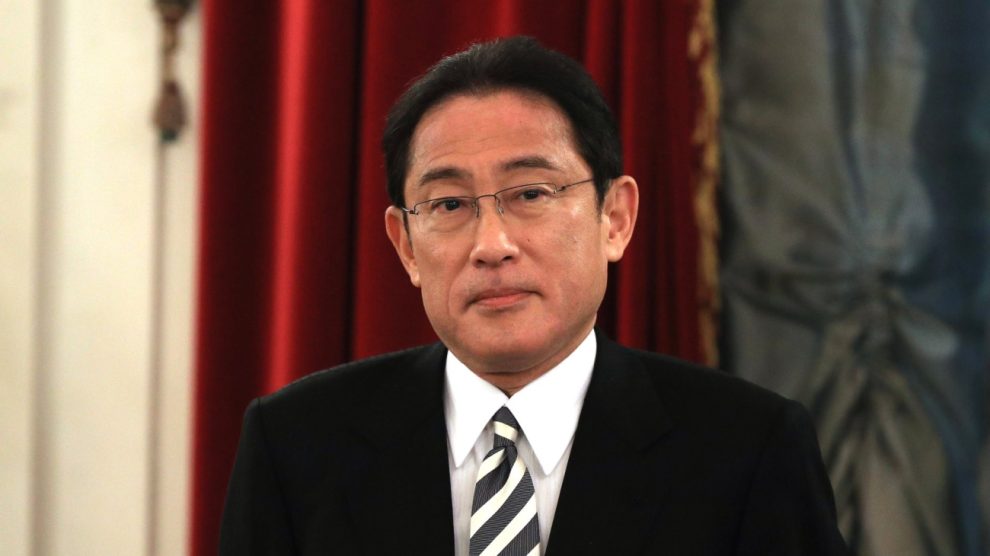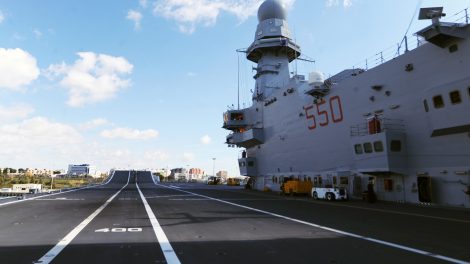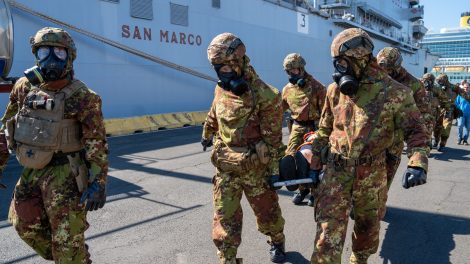THE TAKEAWAYS
- In the past decade, Japan brought Europe closer to the issues of security in the Indo-Pacific. Tokyo primed European capitals against the dangers of Asian autocracies and highlighted the concept of indivisible security.
- As Beijing grew more assertive, PM Abe laid the groundwork for a deeper European involvement. As the former’s assertiveness became clearer to the West, he worked to build a Western-compatible “Free and Open Indo-Pacific”.
- By the time China and Russia struck a “partnership without limits” and the latter invaded Ukraine, several major countries and the EU had developed an Indo-Pacific strategy.
- Multilateral engagement between Japan and the West on military issues has grown in tandem with China’s assertiveness.
- This buildup will likely culminate in PM Kishida attending the NATO Summit in late June.
- Nevertheless, both Japan and the EU would do well to remind themselves of the physical limitations of mutual military support.
- However, EU commitments to increase defence spending will free up resources that the US can then use in the Indo-Pacific.
- Effective security will depend on the alignment of visions and a resulting division of labour.
Japanese Prime Minister Fumio Kishida is slated to attend the NATO Summit scheduled for the end of June. If he attends – an Upper House election that will be held July 10 could upend those plans – it will be the first time a Japanese prime minister joins that conference. Mr Kishida’s attendance is the latest and most high-profile move in a continuing effort by Japanese strategists to more tightly couple Europe to the security of the Indo-Pacific. The call for Europe to pay greater attention to a distant theatre has, ironically, been given new energy by Russia’s invasion of Ukraine. It is one more reason for China to rue the “partnership without limits” that it has forged with the Moscow government.
Japan has had some successes, but there are limits to how far this process can go. It is vitally important that both sides recognize the limits of their partnership to ensure that there are no disappointments in a crisis, when cooperation will matter most.
Japan and NATO began their courtship in the early 1990s following the end of the Cold War. A more intimate relationship was stymied by Europe’s understandable preoccupation with events close to home and the absence of a threat from Asia. For its part, Japanese security policy was constrained by the constitutional and social limits of the post-World War II order.
The Japan-NATO relationship deepened significantly with the signing of a Joint Political Declaration in April 2013, a pact that former Prime Minister Shinzo Abe used to advance his expansive view of national defence and security. His message about Chinese threats and the indivisibility of security challenges has had greater appeal in European corridors as Beijing became more confident and assertive. The bromance between Chinese President Xi Jinping and Russian President Vladimir Putin, institutionalised in their joint declaration on February 4, was built on the concordance of their thinking. China’s support for Moscow’s invasion of Ukraine demonstrated that this convergence was of genuine concern: two of the world’s biggest militaries were led by revisionist powers bent on tearing up the rules of the postwar order.
Part of Mr Abe’s genius was creating a security framework that gave Europe a role in a distant region. The Indo-Pacific, a construct that he first articulated in a 2007 speech to the Indian Parliament, extended what were formerly “Asian” security interests to Europe’s doorstep. Mr Abe asserted that Africa and the Middle East were part of this broader theatre, a claim that allowed Europe to participate if it embraced the same logic.
China nudged Europe to action by flexing its economic muscle through the Belt and Road Initiative (BRI) in Africa, the Middle East and Central Europe, and with “wolf warrior” diplomacy that aimed to punish European governments that dared challenge Beijing. China’s rejection of Western values was another blow, striking at the heart of European soft power, one of its most valuable assets. The association of this new geographical space with Western values to create the “Free and Open Indo-Pacific” was another smart move by Mr Abe to facilitate European engagement.
PM Abe’s logic proved appealing. The European Council released in April 2021 its “EU Strategy for Cooperation in the Indo-Pacific” while France, Germany, and the Netherlands have each drafted a national Indo-Pacific strategy.
Relations between Japan and NATO have accelerated in tandem with China’s assertiveness. In 2017, NATO Secretary General Jens Stoltenberg visited Japan (and South Korea) to consult on ways to strengthen security cooperation, particularly in regard to North Korea. In April of this year, Foreign Minister Yoshimasa Hayashi attended the NATO summit as a “partner,” a first for Japan. The next month, General Koji Yamazaki, chief of staff of the Joint Staff, became the first Japanese military official to join the NATO Military Committee Chiefs of Defence Session. In early June, NATO Military Committee Chairman Admiral Rob Bauer visited Japan for talks on the regional and international security environment following Russia’s invasion of Ukraine. All this is leading up to Mr Kishida’s attendance at the NATO summit in Madrid later this month.
Multilateral engagement builds on the efforts of individual European governments to heighten their military presence in the Indo-Pacific. A British amphibious assault vessel made a port call in 2018 to Yokosuka naval base in Japan, home to the US 7th Fleet. London then deployed a carrier strike group in 2021 and has since decided to keep two warships in the region on a permanent basis for at least five years. The UK’s inclusion in the Australia-UK-US (AUKUS) enhanced trilateral security partnership further cements its ties to the region. Germany dispatched a frigate to the region from August 2021 to February 2022 during which it joined freedom of navigation and exercise with regional navies as well. With military bases in the south Pacific, France can be considered an indigenous power and its navy has joined exercises throughout the Indo-Pacific.
All these efforts are intended to align European security thinking with that of Japan, to demonstrate the holistic nature of security and show that threats to order in one part of the world will have impacts in other, distant theatres. As Foreign Minister Hayashi said at the April meeting, “it is not possible to speak about the security of Europe and the Indo-Pacific region separately … unilateral changes to the status quo by force are unforgivable no matter the region and that it is vitally important to maintain and develop the international order based on universal values in all regions for global peace and stability.” Indeed, NATO’s next strategic concept will reportedly take into account the growing impact of Chinese behaviour on the security of member states.
There is a limit to how far this alignment can go. Distance remains formidable and the resources that Europe can deploy in an Indo-Pacific contingency are constrained – as is Japanese assistance to Ukraine. Indeed, that conflict is something of a model. Europe will be expected to provide diplomatic support for the regional order, to impose costs on China for breaching the peace and to assist countries directly affected by those misbehaviors. There will be little, if any, reliance on European defence capabilities.
Newly enhanced capabilities can serve in the region in another way, however. European commitments to spend additional money on defence will free up resources that the US can then use in the Indo-Pacific. Also, increased spending will help defence hawks in Japan make the case that they too must up their game. It is difficult to understate the importance of that echo chamber.
Effective security will depend then on the alignment of visions and a resulting division of labour. Reciprocity will be key, as will realistic expectations in a world in which self-defence will predominate, no matter how “like-minded” nations may be.
Brad Glosserman is deputy director of and visiting professor at the Center for Rule-Making Strategies at Tama University as well as senior adviser (nonresident) at Pacific Forum. He is the author of “Peak Japan: The End of Great Ambitions” (Georgetown University Press, 2019).




